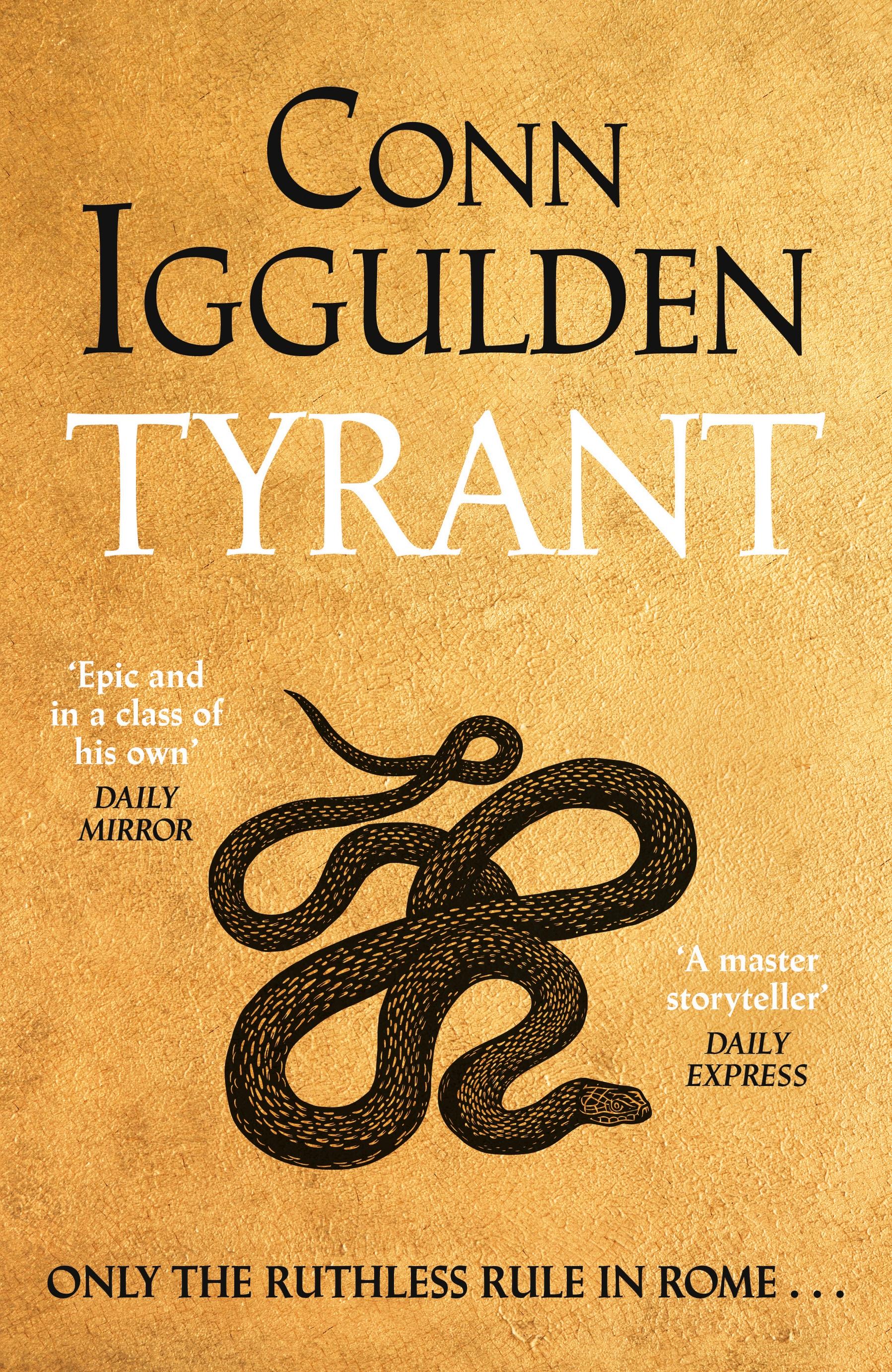

TYRANT
Books by Conn Iggulden
neronian series
Nero Tyrant Dunstan
athenian series
The Gates of Athens
Protector
The Falcon of Sparta
the golden age series Lion
Empire the wars of the roses series
Stormbird
Trinity Bloodline Ravenspur
the emperor series
The Gates of Rome
The Death of Kings
The Field of Swords
The Gods of War
The Blood of Gods
the conqueror series
Wolf of the Plains Lords of the Bow
Bones of the Hills Empire of Silver Conqueror
Blackwater
Quantum of Tweed
by c. f. iggulden empire of salt series
Darien
Shiang
The Sword Saint
by conn iggulden and hal iggulden
The Dangerous Book for Boys
by conn, arthur and cameron iggulden
The Double Dangerous Book for Boys
by conn iggulden and david iggulden
The Dangerous Book of Heroes
by conn iggulden and illustrated by lizzy duncan
Tollins: Explosive Tales for Children
Tollins 2: Dynamite Tales
Conn Iggulden TYRANT
BOOK II
PENGUIN MICHAEL JOSEPH
UK | USA | Canada | Ireland | Australia India | New Zealand | South Africa
Penguin Michael Joseph is part of the Penguin Random House group of companies whose addresses can be found at global.penguinrandomhouse.com
Penguin Random House UK , One Embassy Gardens, 8 Viaduct Gardens, London sw11 7bw penguin.co.uk
First published 2025 001
Copyright © Conn Iggulden, 2025
The moral right of the author has been asserted Snake illustration copyright © Artur Balytskyi/Alamy
Penguin Random House values and supports copyright. Copyright fuels creativity, encourages diverse voices, promotes freedom of expression and supports a vibrant culture. Thank you for purchasing an authorized edition of this book and for respecting intellectual property laws by not reproducing, scanning or distributing any part of it by any means without permission. You are supporting authors and enabling Penguin Random House to continue to publish books for everyone. No part of this book may be used or reproduced in any manner for the purpose of training artificial intelligence technologies or systems. In accordance with Article 4(3) of the DSM Directive 2019/790, Penguin Random House expressly reserves this work from the text and data mining exception
Set in 13.5/16 pt Garamond MT Std
Typeset by Jouve (UK ), Milton Keynes
Printed and bound in Great Britain by Clays Ltd, Elcograf S.p.A.
The authorized representative in the EEA is Penguin Random House Ireland, Morrison Chambers, 32 Nassau Street, Dublin d02 yh68
A CIP catalogue record for this book is available from the British Library
hardback isbn : 978– 0– 241– 58734– 8 trade paperback isbn : 978– 0– 241– 58735– 5
Penguin Random House is committed to a sustainable future for our business, our readers and our planet. This book is made from Forest Stewardship Council® certified paper.
To Detective Constable Alan Bray











HISPANIA
















































The Roman Empire, First Century ad



GERMANIA



































Rome
Ostia
Gesoriacum
Lugdunum
Lutetia
P
Sicilia
BRITANNIA
GAUL
River Somme
River Medway
River Thames
Cyrnus





Pontia
Pandateria
GERMANIA
Baiae
Misenum
Capreae
ITALY
Neapolis
Herculaneum








MACEDONIA
THRACE





































Athens





















Jerusalem

Alexandria
EGYPT

JUDEA
SYRIA

Pompey’s Theatre
Tarpeian Rock
Julio-Claudian Family
JULIUS CAESAR
Lucius
AUGUSTUS
Claudius Nero
Marcus Agrippa Potumus
Agrippina the Elder Germanicus
Agrippina the Younger
TIBERIUS Vipsania
Drusus
Gaius Julius Caesar Aurelia
Gaius
Scribonia
Livia Tiberius
Julia Julia
Marcus Agrippa
Nero Drusus
Drusus
Drusilla
Claudilla Gaius (CALIGULA) Gnaeus Domitius Ahenobarbus
Lucius (NERO)
Gaius Passienus Crispus (Italus)
Drusus
adopted married
Antonia the Younger
Marcus Atius Balbus
Atia Gaius Octavius
Livia
Mark Antony Octavia
Lucius Domitius Ahenobarbus
Domitia Lepida
Domitia
Antonia the Elder
Gnaeus Domitius Ahenobarbus
Agrippina the Younger
Drusus
Livilla CLAUDIUS Messalina
Julia Gemellus
Octavia
Tiberius (Britannicus)
Julia
Prologue
Bells sounded across Rome. Thousands were struck, over and over. Every temple acolyte wielded handbells or rapped a bar against a curve of bronze. Like thunder, the notes rolled out, over the seven hills of the city and past the great walls. The result was both patterned and tuneless, filling every street, echoing through temples and arches.
Workers stopped their hurrying to stand in awe at a sound they might never hear again. Their own lives went on, their hopes and tragedies, with the grind of work and the struggle to raise a family. For just a morning, all that was interrupted. The emperor would marry that day, before the sun rose to noon. He would put a gold ring on the finger of a woman many of them knew by name. Agrippina. Daughter to General Germanicus, whom they had loved. Sister to Caligula, whom they had feared. Of the bloodline of Augustus himself.
As Agrippina was in her thirties – with a son of her own – Emperor Claudius had found no blushing virgin to ease him into old age. Both saddles and gloves grow more comfortable with use, so the men said. Fires do not have to rage to warm a bed – and for some, the companionship of a woman can be something he does not even know he needs. Until she has told him so, many times.
On the crest of the Caelian hill, Junius Silanus faced the
praetorians who had come into his home. It was too late to think about how he might have prepared for such a threat. They had brought an iron ram to smash their way in. His door had seemed a fine and solid thing the day before. They had broken it with two blows, like bell notes themselves. Nor had his servants been ready for an armed assault, not in darkness. Before the sun showed, soldiers were crashing through his home, searching every room until they arrived at his bed.
In the pale dawn light, the praetor hid his fear as best he could. Junius was twenty years of age and carried a gladius he had snatched up. The house was large, a symbol of Silanus wealth. He had managed to pull on a robe and sandals, but his hair was wild as he faced them.
He blinked at the uniforms, recognising the regiment that guaranteed the safety of the emperor and his family. In turn, they ignored him, fanning out around the room, checking doors and windows, making sure he was truly alone.
The threat of a single sword did not seem to worry the men who had come into his house. Junius felt his heart hammering so hard he wondered if he would faint. Yet a worm of hope uncoiled, almost painfully. They were imperial soldiers, men of discipline and order. Junius Silanus was both senator and praetor, law officer and one of a gilded eight across the entire empire. His official title was second in rank only to the consuls – with Emperor Claudius above all.
The sword that trembled in his hand suddenly felt foolish. The young praetor tossed it onto the bed.
‘I am Praetor Junius Silanus Torquatus,’ he said, forcing his voice to calm authority.
He could hear bells in the streets outside, the sound spreading across the city. That sense of joy clashed with acid in his mouth. He breathed slowly, sensing confidence in the men who faced him. His older brother would know what to do. Marcus was the head of the family, married with children and already the image of their father. He had protected Junius from tormentors more than once. If he could have been summoned by sheer force of need, he would have stood in the doorway at that moment.
‘Gentlemen, there has clearly been a terrible error,’ he said. ‘I am praetor of the city, a senator – you may present your written orders to me. Perhaps you did not realise this is a private house.’
It was subtle, but two of the praetorians turned slightly as if to question another. That man wore no badge of rank. He was the oldest of them, around fifty, broad and compact-looking. His arms were criss-crossed with thin white scars and Junius saw two fingers were missing from his left hand. The legions were built on men like that, Junius knew. He could sense the violence in him, the battles he had seen. Junius had none of his own to set against that store. Men like that were not much given to sentiment, but neither were they blocks of stone. They could hear reason.
‘If you command here, what is your name?’ Junius began again. ‘Who gave you the order to break into my home?’
His hands were trembling. He clenched them together behind his back. He needed time, to settle the heart that hammered his ribs and made him feel sick.
‘Centurion Sextus Burrus, praetor,’ the man replied. His hair was white and tightly cropped. It looked like rabbit’s
fur. The eyes that met those of Junius were so dark they appeared to have no ring around the pupils. It made his gaze uncomfortable.
Burrus grimaced, as if he suddenly tasted something unpleasant. Junius was not half his age and struggled to read the man’s expressions. The centurion looked ill at ease, but he could not discern the reason. Junius stumbled over his words as he spoke again.
‘You w-will have to describe . . . to explain this extraordinary action to Prefect Rufrius, centurion. Do you understand? Your commanding officer is a close friend of the Silanus family. He too is a praetor.’ Junius felt his patience fray at the impassive expressions of the intruders. ‘Do you understand or not? There has clearly been an error. I am a praetor and a senator. I am of the Silanus family. If you hope to keep your rank, if you hope to keep your back unstriped, you will take these men and leave my home.’
‘I’m afraid there is no error, praetor,’ the centurion said softly.
Burrus looked away for a moment, running a hand over the bristles of his scalp. The sound was a rasp in that cramped space. Junius realised he could smell acrid sweat and was not sure it was his own.
‘What do you mean, no error?’ Junius said.
He heard his voice rising and clamped his mouth shut. He glanced at the sword on the bed. It remained there, tantalising. The threat of violence was still in the room. He could smell it on them, see it in the way they exchanged glances. He could not fight his way out, not with praetorians ready to lunge at him. Only the best were accepted into their ranks, he recalled, his mind fastening on
anything but his fear. Soldiers of twenty-eight legions tried out when they needed recruits, with an elite chosen for duty they regarded as sacred. Of course, they also spent their fighting years in Rome, with all the other legions making sure no foreign army ever came close.
‘I’m afraid . . . my orders are clear, praetor,’ Burrus said. ‘You stand accused of incest. I have already . . .’
He was interrupted by a bark of laughter from the young man who faced him.
‘Incest? My mother is dead, centurion! Or am I meant to have defiled her ashes?’
The praetorian went on, his voice dull.
‘Your sister is the subject of the accusation, praetor. I have spoken to her – and to her husband. He confirmed what I was told.’
The praetorian looked uncomfortable and Junius suddenly understood. The man was lying – and he knew he was lying. Burrus had enough honour to detest what he was doing. Perhaps there was a lever there, something to turn him away.
‘I demand a hearing to defend myself from these falsehoods,’ Junius said. ‘My sister is a chaste and honourable woman. Her husband, though . . . Yes, I see. There is malice there, I am certain. He is a weak man. Well, I can convene a court under my authority as praetor. My sister will be called as a witness and the truth will come out. You have my word.’
‘Your sister is being taken to exile, praetor,’ Burrus said. ‘I’m sorry, but this . . . Understand: there is no salvation here, no way out. My orders are from the emperor’s household – to make a quiet ending, without fuss. There will be no trial, no public accusations. You are a young
man, sir, without children. You have brothers to carry on your family name.’
Again, Junius saw the discomfort in him.
‘You may take your own life with dignity, praetor. Or it can be . . . hard, bloody, more vicious than you would believe. Those are my orders. Believe me, I would choose the quiet path if I could. I do not want to beat you to death, dominus. You are young . . . and in good health. It would not be quick. Understand me, praetor. Whichever path you choose, you will not leave this room.’
The younger son of the Silanus family stared in astonishment at the man pronouncing his death. He opened and closed his mouth.
‘I have never been incestuous with my sister . . .’ he said faintly.
‘The accusation is enough,’ Burrus said. ‘Now, if I lend you my knife, praetor, will you do something stupid with it? I don’t want any of my men hurt. This is a distasteful business and they are just lads doing their jobs.’
‘Lend me . . . ? You expect me to cut my own throat? To go meekly just because you break into my home and smash my door down and demand it?’
‘Lower your voice,’ the praetorian muttered.
He took a pace suddenly, so that he stood very close to the younger man. Junius’ bed was touching his legs and he could not step back.
‘This is an honour, praetor, due to your rank – and yes, the influence and wealth of your family. If you cut your wrists or your throat, if you do that by your own hand, your sister will live in peaceful exile and that will be the end of it. Your family will be told you took your own life in shame. Do you see? This comes from the
imperial household. There is no backing away, no reprieve. Nor do I have the morning to waste debating with you. I can put a sharp knife in your hand. Your rank deserves that much.’
‘This is madness,’ Junius said under his breath. ‘The accusation is . . . a lie.’ He frowned suddenly in thought. ‘And too serious to be some scribe’s slip. The imperial household? I am betrothed to the emperor’s only daughter! When Octavia is of age in a few years, she and I will marry! I am the imperial household, or will be! By the gods, man, will you stop and think for a moment? What if you have come to the wrong family, if the name you were given was meant to be another . . .’
He trailed off as Burrus unsheathed a vicious-looking dagger, wide at the base. It was a legionary blade, as good for hacking down a pine sapling as cutting a throat. It glinted in the dawn light and Junius leaned away from it. Understanding flashed into his mind and he stiffened.
‘That’s it, isn’t it? The betrothal. By Mars, it is! That damned woman is behind all of this. The one who has the emperor tangled in her skirts, who marries today. The source of those cursed bells !’ He shouted the last, driven to it by the constant clang and jingle that had only grown since he’d been wrenched from sleep.
Slowly, Junius sat on the bed. Burrus held the blade out.
‘I am sorry, praetor, truly,’ Burrus said.
He did look regretful, but there was no give in him, no change. For the first time, Junius understood, really understood. There would be no last-minute salvation. His brother would not hear until he was dead – and Marcus would do nothing, not if the emperor’s wife stood behind it. Emperor Claudius was getting married that morning
and if his new bride had marked Junius for death, that would be her wedding gift.
‘Give me a little time, would you?’ Junius said. ‘To write letters to my family. If you do that, I will take the knife from you and cut my wrists.’
‘I need to get back to the Palatine, praetor,’ Burrus said. He glanced aside to where a small table held the bits and pieces needed to send a letter. Sealing wax and vellum rested there, with a dark ink block and a little jug of Tiber water. A night lamp was still shuttered, the flame tiny over its reservoir of oil. The praetorian’s mouth twisted as he considered it.
‘Please,’ Junius said. His voice cracked. He had accepted there was no escape, but the reality of what that meant was still dawning. There was fear in his eyes as he met those of the centurion.
‘Very well,’ Burrus said.
He’d thought this would be an ordinary duty when he’d been given it. A young praetor offered a chance to take his own life rather than bring shame on his family. Burrus shook his head as Junius bent over his desk. Ignoring the clay jug, the young man spat on the ink stone, working a scraper back and forth until he had a smear he could use.
The praetorian no longer believed the accusation, but that didn’t change anything. Burrus had sworn an oath to protect the imperial family – and to obey their orders. Of course, Agrippina was not quite a member of that family, at least until Claudius made her his wife. That was a distinction that mattered about as much as the guilt or innocence of a young praetor. Burrus didn’t know if Agrippina had someone else she favoured for the praetorship, or another suitor for the emperor’s daughter. Nor
8
was he still certain she would look favourably on his chances of promotion, as she had promised. In its own way, Burrus knew his life was as precarious as that of the young man mingling tears and ink on page after page. Agrippina understood power – both in the reality and the promise of it. If she could bring down a praetor with the right words and a few hard men, the life of Sextus Burrus would be of little consequence.
After an age, the centurion laid a hand on the young man’s shoulder.
‘Finish the letter, would you, son? That’s long enough, I’d say.’
He watched as Junius signed his name with a swirl, folding the vellum. With the ease of long practice, the young man opened the little lamp. He lengthened the wick and passed a stick of wax through the flame. It dripped where he placed it on the letter, a circle of red and soot like a bloody coin. His own ring sealed it before it dried hard.
‘Give me the knife,’ he said.
The centurion nodded, passing the blade to him, hilt first. The others were all watching, ready to move. It might have been the dagger in his hand, or the presence of death that had come into that room. One of them licked dry lips in anticipation. This was better than some dull duty in the barracks or keeping crowds back from the emperor’s carriage. The noise of bells had risen to a great crescendo outside, so that the entire city rang with it.
Burrus stood very still as the young man rose from his seat at the table, the knife in his hand.
‘Don’t try it,’ the praetorian muttered.
Junius nodded, then stepped forward suddenly, with all the speed of a young man driven to desperation. Burrus
began to duck, but froze as he felt the edge of his own knife pressing his throat. The lad had moved like a rattlesnake – and the truth was, Burrus hadn’t seen battle for many years. He felt himself growing hot as his cheeks flushed. Before he could speak, Junius took the knife away and held it up, as if he surrendered.
‘I just wanted you to know,’ he said with a shrug. ‘I could have taken you with me.’
Burrus blinked, caught in rising anger that had nowhere to go. It was such a young man’s move! A pointless show. He touched his neck and saw a faint smear of red. He’d sharpened the thing himself for that edge. By the gods, he loved the young praetor then for his moment of madness.
Burrus nodded rather than speak, conceding the point. He knew the others would mock him when they were heading back to the barracks. A man at fifty can’t match the speed of one of twenty! They would know that just as well as he did. He scowled. He would have to knock one of them down. He saw them exchange worried glances at the fierceness of his expression and nodded to himself, breathing like an old bull. Good. Let the bastards fear his wrath.
‘I . . .’ He caught himself. The young man’s eyes were wide in fear and rage. Nothing Burrus could say would ease the moment. ‘There’s no more time, son.’
Junius laid the dagger against his left wrist and cut with huge force. The gash was appalling, blood gouting in an instant. He made a strangled sound as he tried to change grip to cut his other wrist. His left hand hung limp so that the knife slipped from its grasp. He staggered and Burrus took the blade as he sagged onto the bed. The centurion
watched the young man’s eyes grow dark. The praetor saw something coming. He tried to turn his face from it.
Burrus cursed when he saw it was taking too long. A healthy male could cling to the world and make dying a hard, hard thing. He couldn’t have that, so he made the second cut himself. Redness sank into the bedclothes, spreading beneath and rising as points through the weave. The praetor sagged onto his side, breathing slowing to a halt.
Burrus waited a little longer.
‘That’s done, then,’ he said, grim with anger.
He’d thought his men might make some joke at his expense, but they saw the way he glared and decided not to say a single word. They watched him burn the letter to ashes in the lamp’s flame. He and his men left the estate then, the sound of bells still on the air.
As they marched back towards the Palatine, Burrus stamped as if he wanted to break in a new pair of sandals. He knew his men exchanged worried glances, but he didn’t care. He’d obeyed the orders he’d been given, to the letter. There were times when a senator took up some vile perversion, slept with the wrong wife or just crossed the wrong man. There were no public trials then, Burrus knew, no accusations back and forth until the whole city knew everything. Those men were given a knife, or sometimes poison – told to choose suicide rather than disgrace. He knew that was the way Rome worked! Until that morning, he’d seen the sense of it. Some things were best handled quietly, without the plebeians of Rome learning all the sordid details. For the dignity of the emperor or the senate, such things could be justified. It wasn’t a matter for law, but a deeper justice.
He still remembered the senator who murdered his slaves, apparently for his own enjoyment. When a much younger Burrus had been sent to his door, that old man had scorned him, claiming the right to do exactly as he pleased with those he owned. He had refused to cut his wrists, Burrus remembered. Death had come quickly even so, the old man strangled by a praetorian’s hands. A younger Burrus had lost no sleep over him. He’d felt worldly-wise with his new understanding. To be a praetorian was more than just parades and helmet plumes. It meant unpleasant work on behalf of the empire’s heart.
He clenched his jaw. If he’d known then it would mean a quarter century with no promotion, that his career would stall and become cold ashes, he might have gone sick that day. Year after year, he’d had to watch lesser men rising through the ranks – and Rufrius made prefect of his beloved legion. All because Burrus’ hands had been the ones around that senator’s throat.
He had tried to be a good man, but the unfairness had eaten at him. He’d followed his orders and put a savage old dog out of his misery. In return, Rome had forgotten him. There had been a time when senior men had marked Burrus as a star on the rise, a centurion with a quick mind and good sense. A man others followed. That had all vanished like morning frost, until she’d found him.
He looked up at the Palatine hill as he reached it. She was up there in the temple to Juno, marrying the stooped figure of her husband, Emperor C-C-Claudius. Burrus knew the Persians and the Jews talked of angels. She had seemed like one of those when she’d come to him and walked at his side. A chance to redeem himself, with the promise of an empress’s favour. It was the sort of thing
he’d daydreamed over the years, while he watched Prefect Rufrius strutting and growing too fat for his uniform. Redemption. Another chance.
Burrus blinked as his eyes stung. Every time he closed them, he could see the ridiculous bravado of the young man who’d chosen to press a knife against his throat, to reclaim a single moment of dignity in a move so pointless it made Burrus want to embrace him. He hardly remembered being so young! Leaving Junius Silanus behind with his wrists opened did not feel much like redemption.
part one ad 50
1Agrippina stood at her husband’s shoulder as he read. She knew Claudius could devour records and histories at great speed, running his eye down a page with one finger, then flicking it aside. He may have sounded like a fool when he stammered and struggled with words, but he was not one. Just as he looked like an emperor when he sat still. The moment he moved, the limp and shuffle made her wince, the great head that wagged with every step. She told him it was the weight of his thoughts that bowed him down and made his back ache. The truth was somewhat simpler. Claudius had been born badly, drawn into the world by some backwoods Gaulish midwife instead of a matron of Rome. His body had been twisted in the process.
‘Are you still reading?’ Agrippina prompted. Nor was her new husband an innocent, though Caligula had treated him as one. Her brother had made Claudius the court fool, humiliating him in front of senators and slaves. Claudius had accepted every blow and jest without a sign of resentment. In Caligula’s court, that had kept him
alive while many others perished. Her entire family had been plucked by fate and men in power, one by one, until Agrippina was the last, beautiful as summer – and empress of Rome.
‘N-nearly f-finished,’ Claudius said. She nodded in reply, her face perfectly still. She’d assumed she would stop hearing the stutter after a few months of marriage. The reality was different, like a squeaking gate in a storm. It grated on her and she had to struggle not to interrupt, to hurry him along to the end of the sentence. If her patience failed, he fell back into his old acceptance, the image of a meek man. Yet she knew how much those old wounds stung, how the poison still brimmed, ready to spill over. Claudius was more complex than her previous husbands. His power was absolute, and yet there were times when she could lead him, gentle as a lamb with her rope around its neck. It was a dance between them, or a debate. She could use his awe at her beauty and a woman’s caresses. He reacted to her hand like a colt to its first bridle, looking into her eyes in a sort of wonder until she was tempted to check her own reflection, to see what only he could see. She rubbed his head when he was weary, but it was more than the comfort of warmth or her hands. He wanted to please her and so gave her whatever she wanted, like adopting her son into the imperial family. In return, she talked to him, enduring his stammer until she wanted to scream, helping him order plans and ideas until he was ready to make them in stone. Her previous husbands had not wanted to talk, she thought wryly. Claudius would not be racing chariots or leading men to battle. Yet he was strong enough where it mattered. He . . .
‘You are s-sure of the n-name?’ he said suddenly, looking up and back at her. ‘Once I add my s-seal, it cannot be undone. The adoption w-will enter the . . .’ He struggled to finish, growing red until he almost spat the word ‘record’.
Agrippina leaned closer, letting him enjoy the scent that surrounded her in a cloud. All men knew when she had swept through a room. That oil had been brought from the heart of Egypt, the very one that had touched the throat and thighs of Cleopatra. A single bottle was worth more than its weight in gold, but she loved the musky intensity of it, for its heat and the effect it had on Claudius. He was pharaoh of Egypt that day, after all, just as he was emperor.
Even as she leaned over, pressing against his shoulder, she knew he glanced at the slope of her neck, the way the cloth of the stola shifted to reveal her breasts. She was in her thirties, renowned for her beauty. Claudius had turned sixty that year. He breathed her in and she remained innocently unaware of that gaze as she read and nodded.
‘It is as you suggested, Claudius. “Nero” . . . after my brother. “Claudius” to honour you, before even my family names. Then “Caesar” for the bloodline, “Augustus” for the family and “Germanicus” for my father. “Nero Claudius Caesar Augustus Germanicus”. It is a good name, old and new together.’
‘I only h-hope he c-comes to d-deserve it . . .’ Claudius stammered.
Said quickly, it might have been a quip, an amusing aside. As it was, he made it a labour and Agrippina had to force herself to smile. Her only son attracted trouble, bringing chaos wherever he set foot. She knew better than the emperor what a long road lay ahead. Yet she noticed too that Claudius had not appended his name to the sheet.
Claudius was an educated man: he needed no ring seal. Yet until he scrawled his name on the white, her son was not part of the imperial family, nor protected by it.
Two senators had come to witness the adoption of her son Lucius Ahenobarbus into the emperor’s family. Agrippina sensed their discomfort as she knelt at her husband’s side, resting one arm and her chin on his bare thigh as she looked up. She ignored the presence of others, focusing completely on her husband as if the room was empty. Claudius reached out and stroked her hair.
‘He will honour Rome – and you, Claudius,’ Agrippina said in a low voice.
Still, he did not sign! Would he make her repeat every argument she had brought to bear over the engagement and the first months of marriage? She had worked on Claudius like a sculptor, in bed and out, as a wife, as a mother, whatever he needed from her. She had felt his will sag like a candle in the sun under that assault . . . but again and again he found some reason to delay. She’d wondered at times if Claudius enjoyed having her need something from him. He knew she would do absolutely anything to get her way. Perhaps that pleased him, just a little. Perhaps it made up for her finishing his sentences, or repaid the bills for the huge villa she was building on the coast. Would he prefer she lived in a shack?
She tilted her head a fraction. Her hair brushed his thigh and she knew full well how his imagination would react. She had never thrilled to love, not as men did. Perhaps she had been married too early, or treated too roughly by her first husband, she didn’t know. There were times when she enjoyed the sheer physical combat of it, as if she galloped a horse to collapse, sweating and red-faced at the end.
Nothing Claudius wanted was more than a little work – and what she won in return was simply everything. It meant she could endure the grunting noises he made, the way he rocked back and forth until she wanted to push him off, rolling him away like a beetle.
She pressed his thigh, splaying her fingers. It was strange to feel the muscle there. It was not the great shank of her first or second husband. Both those men had ridden and marched from their earliest years, forging legs of rippled strength. Claudius was more slender, but still a man. She sensed him rousing to her touch and saw a deep flush begin on his neck. The emperor half-turned, as if to send the senators away. Yet he had not signed! This was the crisis, she realised. She rose to her feet and took his hand in hers, guiding it to the parchment once more.
‘I will make him honour you,’ she said.
Claudius nodded, thoughts aflame, eyes almost feverish. He scrawled his name and title with a flourish and then watched as the senators came forward to add theirs, scattering sand over the ink to stop it seeping into the sheet.
‘You have my g-gratitude, senators,’ Claudius said, dismissing the men without breaking from his wife’s gaze.
Agrippina let herself settle once more, like a flower as her skirts puffed with air around her. She could see the passion in her husband as the senators hurried out. She was relieved, pleased, exhausted at the battle won. It was time to gallop across the meadow once again. She began to undo her dress, letting it fall from bare shoulders while Claudius watched her greedily. Vulnerable, she stared up at him as he rose from the desk.
‘Thank you, Claudius,’ she said.
Lucius cursed, slapping furiously at himself as he trotted along with his two friends. He’d been stung about a dozen times and he ached with pain. He hated wasps! The things were not mindless like beetles or ants. No, they were spiteful somehow, swimming before his vision as he’d scraped their nest into a cloth. A few of the angry bastards still followed the three boys as he looked back. They were so fast! Their nest had been just some pale and papery thing in the corner of an old shed. He’d thought it might have been abandoned at first, but when he’d poked it with a stick, they’d poured out, looking for a fight. He hated them, honestly. They didn’t even give honey, or not that he could see. His tutor said they ate ants, which had interested him for a time. Lucius had wondered if he could build a miniature arena, with panes of clear glass, where wasps and ants might fight for the amusement of his friends.
He grimaced as he wound his way along the track. His tutor would be in the little schoolroom, he had no doubt. Magister Anictetus was always prompt and lectured his young pupils on the civility of arriving early. The man could talk! By the gods, he could lose an hour to any subject Lucius could imagine. Lucius had thought it was his only weakness, that if one of the boys asked the right question, an entire session could be lost to the answer, while they stared and pretended to be fascinated. Of course, he’d found another weakness in the end. That was why it paid to remain alert, to see the world around him as no one else seemed to.
He looked over, to where Otho held the other end of the twisted blanket. His face too was swollen in great pink and yellow patches. His mouth looked like a child’s
drawing, with one lip swollen to the point of absurdity. Lucius chuckled at the sight, though Otho only rolled his eyes. They had all suffered. It seemed wasps were warlike creatures, more aggressive than the boys had imagined. No one had escaped their wrath, not even the youngest of them, Serenus, who had remained as lookout at the door and been stung on the eyelid for his pains. He stumbled behind the others, still wincing.
The gardens of the imperial estate on the Palatine were tended by a vast number of slaves, too many to learn their names. Lucius and his friends had been all over it, so that they knew a few of the gardeners by sight. Still, there shouldn’t have been a wasp nest, even in a tiny shed far out on the edge of a garden clipped and sheared and planted to perfection. That was why Lucius had acted that day – it could have been found and removed at any moment. He rubbed the lumps along his arm again, a cluster of the things. Improvising a plan with a twist of cloth had cost them dearly, but it could still be worth it.
Ahead, the path ended at a bank of herbs, some garden of the imperial kitchen. The scent of bay leaves, garlic, onion and rosemary were thick in the air as the boys pushed through, taking care not to let their burden graze bare skin. Lucius peered at it in fascination. He had seen tiny thorns piercing the cloth as the vicious little beasts tried to sting whatever pressed them. He could almost admire the depth of their rage, the sheer mindless force of it.
Across a strip of tended lawn lay the schoolroom. Before that year, Lucius understood it had been some sort of store. It still had the smell of old grass clippings and sweat. His mother had brought in wooden benches, a table that gleamed with linseed oil and all the slates and chalk
her son might need to learn Greek and Latin. He glowered at the thought, imagining Magister Anictetus already pacing up and down, tutting to himself. The man had small feet and a twitching manner, like a dancing tutor or a songbird. They were already late. Even if the boys entered at that moment, they would be made to bend over and striped by the whippy cane he always carried. Lucius had stolen it once, snapping it in two pieces. The magister had brought an identical one the next day and beaten him unmercifully. The fussy little man deserved all he was going to get.
It had been the merest accident that Magister Anictetus had been stung by a single wasp as he used a sheaf of parchment to push it towards the open air. Lucius and Otho had seen him sweat then. His hand had swelled to an extraordinary degree, the fingers like fat figs. They’d said nothing at the time, but an idea had been born. If the teacher reacted like that to just one sting, what would happen if they found a nest and threw it into his schoolroom? Lucius hefted the squirming weight, already grinning in anticipation.
‘Ready?’ he said softly.
The others nodded. Otho was a year older and wore the toga virilis of a man. He said he’d put his fingers in a local girl, which intrigued the other two as it was something beyond their knowledge. Sitting together on a fallen tree in the park one day, Otho had even let Lucius put his hand inside a girl’s dress, slipping down the curve of her buttocks. She’d thought it was Otho’s hand at first, until he held her head to kiss her. The result had been shrieking and being chased, but Lucius still remembered the softness of her skin and the feelings it aroused.
On a normal day, without the presence of a distracting
female, Lucius was the one who came up with games and ideas. Denied the area of his adult expertise, Otho was happy to follow Lucius’ lead. Bigger than either of the other two, he could also be relied upon to win a fight with boys of the city, if it came to that. They were friends, the three of them. It was summer and life was sweet.
Lucius grinned as they untwisted the wrap of cloth, swinging the weight of the nest between them. The wasps were going mad, the folds surging with horrible movement. He looked up. The open window was some way off the ground. It had to be perfect.
‘If it goes wrong, just run,’ Lucius hissed. He could not take any more of the angry wasps after him. One way or the other, he’d be sprinting for the hills no matter what happened.
He froze suddenly. His plan, and he had almost ruined it!
‘Serenus, the wedge! Have you still got it?’
His friend held it up and Lucius waited for the younger boy to realise he was in the wrong place. With a curse, Serenus ran off, disappearing around the building.
‘I’ll count to . . . thirty,’ Lucius said. ‘That’s long enough.’
Otho nodded grimly. A few of the wasps had wriggled their way out and were climbing along the cloth towards their hands. Otho watched one reaching his thumb, buzzing wings as if to ease them after its captivity. The main nest was still concealed, but without the twist . . . He heard Lucius yelp as one of them attacked.
‘That’s long enough,’ Lucius snapped. ‘Ready? One, two, three!’
They swung cloth and nest together in a great heave. It went in through the window and thumped on the wooden floor inside. A greater buzzing could be heard then, along
with the first questioning voice of the magister, followed by anger and horror.
Lucius grinned at his friend, the pain from the stings suddenly forgotten.
‘He comes close to see what has arrived through the window,’ he murmured. ‘He sees the wasps and remembers the last one. He runs . . .’
They heard hammering and began to laugh. One little wooden wedge could jam a door. Serenus had kicked it into place from the outside, holding it shut. The magister yelled in fear as he attacked the wood, but there was no way out. Lucius wondered if he would think of escaping through the window, but the nest had landed there. The wasps would surely bar the way.
A few of the buzzing insects drifted out of the window above. It was the sight of those that made Lucius and Otho move off. They met up with Serenus at the main door and punched one another on the shoulder in a combination of greeting and praise. Just one wasp had given them three days of freedom before. As the boys wandered down the hill to explore the markets, they thought a whole nest would surely win them a week or two, even longer if the magister gave up and went home.
Lucius was snoring when his door slammed open. He had come back to his rooms late and Otho had introduced him to two of the girls he favoured. They’d seemed interested in the heavyset young lad, growing like a weed and already with a shadow on his cheeks, though he had not yet passed his thirteenth birthday. It would be at least a year until he wore the toga of a man instead of a boy’s tunic. Yet one of the young women had caught his interest, with tanned
legs, eyes made huge with kohl and a strange way of holding his gaze. Laitha. He had gone to sleep saying her name and it was she who swam through his dreams, shattering into pieces like a thrown pot as he was yanked out of bed by the foot.
Lucius wore a loincloth and a sleeveless tunic – the nights could be cold, with a hundred halls on the Palatine to suck warmth from the air, or never grow warm at all. He felt himself slide and grabbed blankets, dragging them with him so that he hit the ground in a great, roaring bundle of confusion. He was cocooned for a moment, then surged up, panting and ready to fight.
Burrus of the praetorians looked with interest at the dagger in the boy’s hand. He had to have reached for it even as he was dragged out of bed. Burrus saw too that Agrippina’s son wore a heavy bracelet of gold and polished resin, with snakeskin glittering beneath the surface. That snake had saved his life years before, so it was said, when assassins had come to his home outside the city. Perhaps that was why he still slept with a knife to hand, Burrus thought.
‘Put that down, son. Your mother has summoned you.’
‘So? You’re not prefect of the praetorians, are you?’
Burrus said nothing, though Lucius knew he had scored on him.
‘No, not until Rufrius retires. Perhaps not even then. You can’t just come in here when I’m sleeping! Get out.’
With wide arms, the boy tried to crowd him out of the room. It might have worked on his younger brother or one of the house slaves. Burrus was reminded of the bravado of a young praetor. That was not a pleasant memory and he reacted more harshly than he would usually have done. With a quick strike, he smacked Lucius’ arm, knocking the
knife from his grip. It went skittering across the tile and he thought the boy might leap for it.
‘The emperor is still up,’ Burrus snapped. ‘Your father, as he is now. Your mother sent me to fetch you to his presence – and I am a praetorian, sworn to obey the orders of the imperial family. I will do that, even if I have to carry you over my shoulder, bawling all the way.’
‘What do they want?’ Lucius said.
Burrus saw him strangle down the outrage, his eyes narrowing. It wasn’t a bad set of reactions to being woken. First a blade, then the self-control an adult male was expected to have at his command. It was not what Burrus had expected from Agrippina’s son. He raised his eyebrows.
‘Come with me and find out. Put your sandals on. There are sweat stains on that tunic. I’d change first if I were you.’
Lucius waved away the suggestion, then ran fingers through thick black hair. He was a solid boy, Burrus thought, muscular and deeply tanned as if carved from olive wood. His legs were thick with muscle, the inheritance of his true father, perhaps. In another life, he’d have made a decent soldier.
Burrus broke off his examination. The boy’s mother would never let him march with a legion, nor be a charioteer like his father. She had some different path in mind. That was the privilege of beautiful women, of course, to do as they pleased.
He saw her son’s gaze had come to rest on his maimed hand. Burrus raised it for him to get a good look. He’d hidden it from staring eyes for years, keeping it behind his back whenever he was in public. Little by little, he’d grown furious with himself. These days, he held it where anyone could see.
The little finger and the fourth had been cut away on his left hand. It was not an uncommon injury for a legionary. Burrus hadn’t even felt it as he’d taken the wound, fighting in Britannia for the emperor. He was just pleased to have kept the rest of the hand. Legion medics were too quick to hack off entire limbs, set on making their work easy. His praetorian doctor had been a Greek, for which he thanked the gods. That man had tended him for three weeks with bread poultices, hot wine and vinegar, squeezing out pus each day until it ran red.
Burrus turned the claw back and forth. He still had the thumb, that was all that mattered. With a thumb, he could pick up a jug, or grip the strap of a shield. He could have taken a pension and retired from the legion, but he’d stayed on. He was, in the end, a stubborn man.
‘Seen enough?’
The boy nodded, though he could not seem to drag his gaze away.
‘Did it hurt?’ Lucius asked.
Burrus snorted.
‘No. Come on now. Your mother is waiting.’
It pleased Burrus that the boy made no more objection, falling in beside him as they strode along the corridors of the palace complex. The praetorian forced a fast pace, but the lad kept up without breathing hard, swinging along as if he hadn’t a care. If it was an act, he did it well, Burrus thought.
The boy’s sleeping room was a long way from the imperial quarters. Though the world was still dark outside, Burrus could feel something like tension rising in his gut as they drew closer. There were lamps in the corridors around Claudius, low to the floor on ornate stands of
bronze and polished wood, burnishing tiles and walls. Praetorians too were there, saluting at every corner and set of doors. Burrus felt the boy watching as he accepted the gestures and returned them, murmuring a word of praise here and there.
‘Do you know all of them?’ Lucius asked.
‘I do,’ Burrus said. ‘I have been a centurion for over twenty years. Long enough to learn a few names.’
‘The last praetorian prefect took his own life,’ Lucius said. ‘And the one before that. Will Prefect Rufrius do the same, do you think?’
Burrus had reached the corridor leading to the emperor’s private rooms. He clenched his jaw.
‘I’m sure Rufrius will retire in peace to tend his vines,’ he muttered. ‘Or die of old age, perhaps.’
Lucius grinned at that response.
‘Will you lead the praetorians after that?’ he asked innocently.
‘I have no such ambition,’ Burrus said.
‘But if the emperor chooses you . . .’ Lucius prompted.
‘If the gods and the emperor select my name, I will not refuse. Beyond that, I have no desire for anything more.’
‘I suppose you might end up taking your own life, then,’ Lucius said.
‘Perhaps. Or perhaps I’d break the pattern just to spite you, you little shit.’
Lucius didn’t have time to reply, though his mouth opened in surprise. As they approached the door, guards to either side suddenly crashed to formal attention, alerting those in the rooms beyond. Slaves drew the doors open and Burrus and the boy went in.
